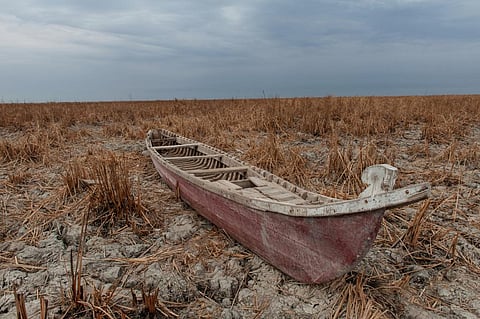

Climate change has made the three-year extreme drought about 25 times more likely in Syria and Iraq, and 16 times more likely in Iran, according to a new report.
In a 1.2 degrees Celsius cooler world, the extreme drought would have been classified as normal, stated the analysis from the World Weather Attribution, an academic collaboration studying extreme event attribution.
This, according to the experts, suggests that drought would not have occurred without climate change, primarily driven by burning oil, gas and coal.
“For people living in Iran, Syria and Iraq this drought has had dire consequences on their livelihoods and health,” Rana El Hajj, Red Cross Red Crescent Climate Centre and one of the authors, said in a statement.
West Asia, covering Iran, Iraq and Syria, has been in the grips of a drought since the winter of 2020. These regions witnessed up to 95 per cent below-average rainfall.
The drought displaced nearly two million people living in rural Syria, according to reports. Around 60 per cent of the inhabitants were suffering from food insecurity this year, they added.
Iran has seen water shortages, which has triggered tensions with neighbouring countries. Further, poor harvests have caused food prices to soar. Iraq, too, is suffering from water insecurity.
In Syria and Iraq, El Hajj explained, the impacts of conflict and security concerns have greatly reduced people’s ability to respond to the drought.
The drought in the three West Asian countries has fuelled wide-ranging impacts, including wildfire, air pollution and the spread of water-borne diseases such as cholera.
If the world warms 2°C above the preindustrial era, similar droughts are predicted to strike about twice as often as they do now.
To assess how climate change drove the multi-year drought, researchers used weather data and climate models to compare how the event has changed between today’s climate with approximately 1.2°C of global warming, with the cooler preindustrial climate.
They found that the 36-month accumulated precipitation in the Tigris-Euphrates Basin (covering large regions of Iraq and Syria) and Iran show decreasing rainfall due to global warming. However, the experts highlighted, that the trend is not significant.
In a hypothetical 1.2℃ cooler climate, the return period (the average number of years between two events) of the drought would have been roughly 1 for Iran and 2 for the Tigris-Euphrates basin.
The event, according to the authors, was primarily driven by the very strong increase in temperature and thus potential evapotranspiration, or PET. It represents the combined loss of water through the plant’s process of transpiration and evaporation of water from the earth’s surface.
Other factors such as land degradation, desertification, water stress and conflict have also contributed to the countries’ increasing vulnerability to drought.
The findings run counter to the Intergovernmental Panel on Climate Change (IPCC), which projected drought occurring in the region with low confidence.
“Prolonged heat, driven by climate change, is playing a crucial role in droughts around the world. But attribution studies are showing us that even if climate change doesn’t have a significant influence on low levels of rainfall, higher temperatures are turning many droughts into extreme events,” Ben Clarke, researcher at Grantham Institute - Climate Change and the Environment, Imperial College London, explained in a statement to the press.
The analysis comes a month ahead of the 28th Conference of Parties (COP28) to the United Nations Framework Convention on Climate Change negotiations that will be held in Dubai from November 30-December 12, 2023.
Friederike Otto, senior lecturer in Climate Science at Grantham Institute - Climate Change and the Environment, Imperial College London, warned that more people will suffer from water shortages, more farmers will be displaced and many people will pay more for food at supermarkets if the world does not agree to phase out fossil fuels at COP28.